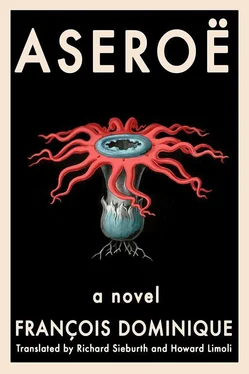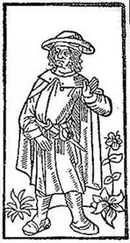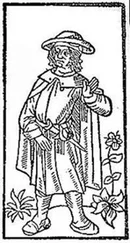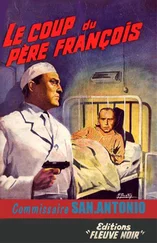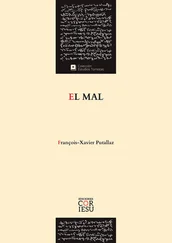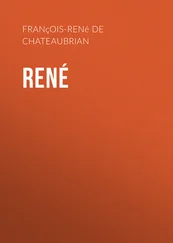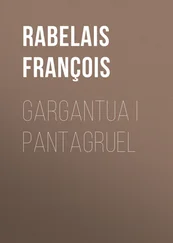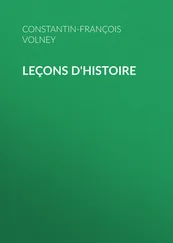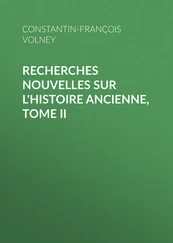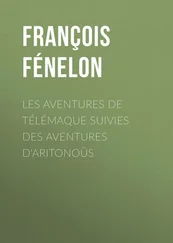François Dominique - Aseroë
Здесь есть возможность читать онлайн «François Dominique - Aseroë» весь текст электронной книги совершенно бесплатно (целиком полную версию без сокращений). В некоторых случаях можно слушать аудио, скачать через торрент в формате fb2 и присутствует краткое содержание. Город: New York, Год выпуска: 2020, ISBN: 2020, Издательство: Bellevue Literary Press, Жанр: Современная проза, на английском языке. Описание произведения, (предисловие) а так же отзывы посетителей доступны на портале библиотеки ЛибКат.
- Название:Aseroë
- Автор:
- Издательство:Bellevue Literary Press
- Жанр:
- Год:2020
- Город:New York
- ISBN:978-1-942658-78-8
- Рейтинг книги:5 / 5. Голосов: 1
-
Избранное:Добавить в избранное
- Отзывы:
-
Ваша оценка:
- 100
- 1
- 2
- 3
- 4
- 5
Aseroë: краткое содержание, описание и аннотация
Предлагаем к чтению аннотацию, описание, краткое содержание или предисловие (зависит от того, что написал сам автор книги «Aseroë»). Если вы не нашли необходимую информацию о книге — напишите в комментариях, мы постараемся отыскать её.
Aseroë — читать онлайн бесплатно полную книгу (весь текст) целиком
Ниже представлен текст книги, разбитый по страницам. Система сохранения места последней прочитанной страницы, позволяет с удобством читать онлайн бесплатно книгу «Aseroë», без необходимости каждый раз заново искать на чём Вы остановились. Поставьте закладку, и сможете в любой момент перейти на страницу, на которой закончили чтение.
Интервал:
Закладка:
In the archives of the diocese, I found no trace of Abbé Coulemas. I saw that Abbé Servin had remained assigned to the Hôpital de la Conception until his death, in 1912. As for Abbé Girard, his case merits full attention: the pastoral register mentions his withdrawal from the hospital in December 1891 for a “nervous ailment” and his being sent to the psychiatric hospital of Saint-Ylie, in Dôle, in the Jura region, where he had relatives.
At Saint-Ylie, in the medical archives, I found the following among the notes of a certain Dr. Kruger (folder E.H. 12 through 22):
—January 17, 1892. First interview with Girard, abbé of the Marseille diocese. Obsessional mania, not dangerous. The patient eats, sleeps, and moves about normally, but cannot engage in any coherent conversation. To questions relative to his past life he invariably responds, “Allah Kerim! Allah Kerim!” and then begins to sing aloud. So far as we know, he has not served in our African missions. Has he spent time in Muslim countries? We don’t know. Cold showers and sleep will help him recover his memory. Fluorine hydrosulphate. Herbal teas as a palliative and sleeping pills.
—February 22. Nurses report that Girard speaks oddly but on a variety of subjects. Progress. However, the other inmates of Pavilion B group themselves around him to listen, even at mealtimes. Report these groups to me and take notes on the patient’s disjointed remarks.
—March 19. Girard seems to have recovered his faculties. But this improvement is accompanied by a curious identity crisis: thus, the patient claims his first name is Arthur and not Claude. He speaks of travels in Europe, to Java, to Cypress, then to the Middle East, to the Somali desert, to Harar, Aden, etc. He especially mentions another country that nobody here ever heard of: Aséré or Aseroé, it remains unclear.
—April 21. Isolate Girard for one or two weeks. His strong influence on the patients has led to a kind of collective delirium. Fear of violent attacks. The nurses aren’t watchful enough. What are they afraid of?
—May 20. This Abbé Girard is strange. He asked to see me without waiting for the usual appointment. When we were alone in my office, he took hold of my head very gently and told me unbelievable things. I’ve never heard anything so beautiful. I am troubled.
—May 22,1892. Yes, at last, WE ARE IN THE LAND OF ASÉROÉ. I am Dr. Kruger, but is this really certain? I…
Here the medical record breaks off. The registers contain nothing else relating to Abbé Girard or to his doctor. I did not find the name of Girard on the release records, although I pored over them from 1897 to 1940.
I decline to pursue the inquiry concerning Dr. Kruger. Let others, more qualified than I, carry on…. As for the land of Aseroë, I know, alas, what to think of that.
3

Aseroë
THAT INERT OBJECT, bespattered with black markings and which represents the written page, offers no organic life, no soul distinct from its flesh. In that restricted space where the eye momentarily encounters it, it barely manages to conceal those memories or expectations that it transforms into costume jewelry or a child’s chipped cat’s-eye marble, bird feathers, yellowed photos, or a gold chain. But supposing that the reader’s vision emerged altered by the work? Would light and shadow no longer clash? Rimbaud’s Noël sur la terre . Christmas on Earth. The rediscovered baubles of childhood, the awkwardness of angels entangled in their own splendor. And as the light of day breaks, colors seem invented, today, for the first time. (6:12 A.M.)
On February 12, rereading these lines scribbled in a notebook three days earlier—from “that inert object” to “colors seem invented, today, for the first time”—I traveled to the city of Semur-en-Auxois to haunt a house lent by a friend.
At lunchtime, I went into the Café du Donjon and sat down far enough away from the bar not to be disturbed. The waitress spread out paper place settings, set white dishes on the tables, decanters, bread, and wineglasses. She bustled about cheerfully, her bright virgin’s face dappled with sherbet and kisses.
There were a few patrons, mostly oldsters. A woman entered holding the hand of a tubby little girl whose stare alighted on me and never strayed till the end of the meal. When the waitress announced the menu (fresh vegetable appetizers, andouillettes, boiled potatoes, a tray of cheeses, coffee—all for fifty francs), the girl giggled agreeably. Her mother showed her to a table and sat next to her. With an easy, tender motion innocent of any impatience, she wiped the girl’s childish chin, tied the napkin around her neck, and ran her hand over the child’s hair.
Sitting at my table, three times I crossed out and recopied the sentence running from “That inert object” to “colors seem invented.” Bright sunlight was streaming into the room, despite the thick frost on the windowpanes. As a child, when I was ill, I would sometimes experience this same high degree of light and would anticipate its caress approaching my face and enveloping me. On this particular day, I was not feverish; my mind, alert to the point of cynicism, declined the surrender I might have otherwise welcomed. Let me hit them with a line of poetry, I thought—a nasty impulse immediately shunted aside by the sensation of completely blanking out, of feeling completely drenched in light.
Objects became sharply outlined; bodies were rendered readable: veins on the skin, strands of hair, wrinkles and crow’s-feet on the face, the fibers of the clothes. Each voice, despite the slight humming in my ears, called out to be heard, to be acknowledged. I crumpled the pages of my notebook (where I had written of “baubles,” of “angels” and of “colors”). Instead, I watched and listened.
The air was stirring around us; I was aware of its currents, its sworls; but what magic was suffusing this café that smelled of frites and tobacco? “Eat!” said the mother. The girl moved her head and waved her right hand above her plate without lifting her eyes from me. “Look at your plate, and eat!” I lowered my eyes to escape her too-insistent stare. I became awkward. My glass of red wine, overturned on the tablecloth, stained my abandoned pages, but this accident did nothing to break the charm: the sunlit dirty walls, the smirched tablecloths, the dumb smiles, the smell of fried fat.
The girl’s stare bore down on me again. Her right hand dropped the fork and moved back and forth in the air, her thumb glued to the tip of her middle finger. Confronted with this obscene gesture, I lowered my eyes and then saw, under the table where she was sitting, her fat legs, her cotton stockings, her snow boots. She was pissing with joy! One of her legs was drenched, while she continued to wave her wrist over the table. The mother grabbed her daughter’s hand and put the fork back in it. “Eat, Nathalie.”
Everything was covered in white light. The bread, the cheese: heavenly manna, its taste heightened by the brightness. Sadness, disgust were gone. Everyone was feeling what I felt; I could tell by watching the surprised faces of the guests. Some were lifting their hands to touch the air; some were laughing like children.
The needles of ice on the windowpanes—melted by sweetness?—parted to let the bright rays shine through, forming stained-glass windows of mother-of-pearl, opened like wings. The fake flowers on the bar counter became as white feathers, beaded with blood.
The idiot girl started to stir again, looking for my glance, waving her obscene hand. A cruel thought assailed me, and I made an effort not to shout aloud “Let her sing, the little fool! Let her sing once or twice in her life, the little bitch!” What she sang wasn’t exactly Orpheus’s song, as you might well imagine.
Читать дальшеИнтервал:
Закладка:
Похожие книги на «Aseroë»
Представляем Вашему вниманию похожие книги на «Aseroë» списком для выбора. Мы отобрали схожую по названию и смыслу литературу в надежде предоставить читателям больше вариантов отыскать новые, интересные, ещё непрочитанные произведения.
Обсуждение, отзывы о книге «Aseroë» и просто собственные мнения читателей. Оставьте ваши комментарии, напишите, что Вы думаете о произведении, его смысле или главных героях. Укажите что конкретно понравилось, а что нет, и почему Вы так считаете.
